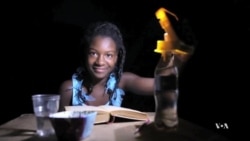This year's Nobel Prize for Physics was awarded to inventors of the light emitting diode, commonly known by the acronym LED, now being used around the world. However, according to the International Energy Agency and the World Bank, more than a billion people in the world still do not have access to electricity. After sunset, most of them use light candles or oil lamps which, in addition to unsteady, flickering light, also give off toxic fumes. A company in the Netherlands is trying to change that with its product based on LEDs.
When darkness falls, many kids in rural parts of Haiti, Rwanda, or refugee camps in Syria read or do their homework by candlelight or a kerosene-burning lamp. The open flames sometimes cause fires, while toxic fumes lead to respiratory problems.
Portable electric light is safer, healthier and now, even cheaper.
“This is the first time that artificial light or solar LED light is now less expensive than kerosene,” said Camille van Gestel, head of a Dutch company called WakaWaka, over Skype.
LEDs are a safe and efficient electronic light source that shines with bright white light.
Van Gestel said WakaWaka, which means "Shine Bright" in Swahili, is the most efficient solar-powered light and phone charger in the world today. When fully charged, it shines for up to 16 hours.
It is affordable, sustainable, and its battery lasts for a long time. It can be set up on any flat surface, hung from a ceiling or perched atop a glass bottle.
Van Gestel said it is intended for the poorest of the poor.
“Our primary target is to reach people who live at the base of the pyramid, who live on less than two dollars a day,” said Van Gestel.
Van Gestel said his company operates like any other business, but some of the money made from selling its products is used to make WakaWaka lights affordable to poor people. He said the initiative is supported by international nongovernment organizations.
“The International Rescue Committee was one of the first to actually take the WakaWaka power into Syria, to provide light and power to Syrian refugees, and now... the WakaWaka is the most valued non-food item in Syria," said Van Gestel.
In the past 24 months, the company has distributed around 300,000 units in places such as Syria, Haiti, Rwanda, Indonesia and the Philippines. Its goal is to reach 1.2 billion people by 2030.









